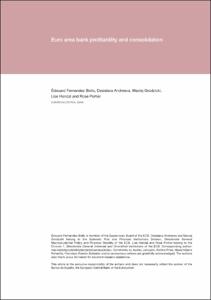Euro area bank profitability and consolidation
Autor
Fecha de publicación
24-may-2021
Descripción física
26 p.
Resumen
Consolidation in the euro area banking sector has been slow since the end of the
global financial crisis, despite the persistent weak bank profitability. The coronavirus
(COVID-19) pandemic has reinforced profitability risks in the euro area banking
sector, and coincided with worse performance of some banks, notably those
burdened with legacy non-performing loans. Consolidation among banks may bring
benefits from both a micro- and a macroprudential perspective by generating cost
synergies, increasing revenue diversification and strengthening the resilience of the
banking sector. However, it comes with attendant execution risks, which need to be
properly managed by banks. Consolidation may give rise to competition concerns,
although empirical evidence suggests that there is room for further domestic
concentration in some euro area countries and for greater cross-border integration of
the European banking market. Bank mergers also increase the systemic footprint
of the resulting institutions, which might be addressed by the existing macroprudential
and resolution frameworks. The European Central Bank assesses consolidation
from a prudential perspective, focusing on the current and future ability of the
combined bank to comply with prudential requirements. To this end, it published a
Guide in January 2021 in which it clarified its expectations and approach to three
key prudential issues arising in the context of consolidation: setting Pillar 2 capital
requirements, treatment of badwill and use of internal models.
Notas
Artículo de revista
Publicado en
Financial Stability Review / Banco de España, 40 (Spring 2021), p. 85-110
Otras versiones
Materias
Regulación y supervisión de instituciones financieras; Instituciones crediticias de depósito; Zona euro
Aparece en las colecciones:












